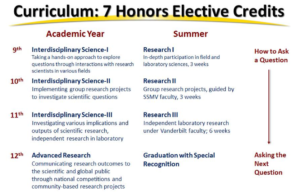About the SSMV
About the SSMV
The SSMV curriculum connects sciences, technology, engineering, and mathematics (STEM) through meaningful and engaging hands-on exploration with increasing depth and independence. During the academic year, students attend SSMV classes on the Vanderbilt campus one full day per week. The curriculum integrates cutting-edge “real world” content through student, SSMV faculty, and Vanderbilt faculty-designed research projects. Through the SSMV, students complete seven courses that each carry the weight of an advanced elective credit (5.0).
 |
|
CurriculumIn Interdisciplinary Science-I, students participate in classroom experiments where they may, for example, extract caffeine from tea leaves during a chemistry lab as a part of a multidisciplinary study of addiction. In addition, guest scientists, physicians, post-doctoral fellows, and graduate students from Vanderbilt University and Vanderbilt University Medical Center visit the class or host laboratory visits to share their expertise. Research I is a 3-week summer course with a focus on field research that spans a broad array of subjects, including ecology, geology, archaeology, chemistry, forensics, and engineering. The majority of Interdisciplinary Science II is focused on small-group research projects designed to engage students in several scientific and engineering disciplines through generating novel data. In the featured image, students are studying the effects of microplastics on plant growth. Research II is a 3-week summer course that allows students to complete a small-group research project of their choosing and then communicate this research to other students through research poster presentations. During Interdisciplinary Science III, students participate in several teaching modules that explore scientific and engineering innovation at Vanderbilt and beyond, including the various outputs of research such as publications, prototypes, and patents. Research III is a 6-week summer internship in a Vanderbilt laboratory where students work alongside a research team to complete a research project. The results of these projects are submitted to national science competitions where students can earn prestigious recognition and scholarships. Also, much of this work is published in the Young Scientist research journal. The Advanced Research course is dedicated to building skills to help students communicate their research not only to the scientific community but also to the broader public. A significant portion of the course concentrates on students participating in community-engaged research projects that benefit Nashville and beyond. |
|
CONNECT WITH SSMV |
|
